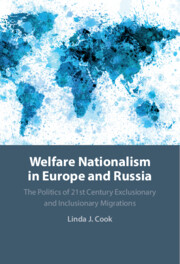 Welfare Nationalism in Europe and Russia
Welfare Nationalism in Europe and Russia Book contents
- Welfare Nationalism in Europe and Russia
- Reviews
- Welfare Nationalism in Europe and Russia
- Copyright page
- Dedication
- Contents
- Figures
- Tables
- Preface
- Acknowledgments
- Note on Terminology
- Abbreviations
- Part I Introduction
- Part II Economic Drivers and Political Mobilizers of Welfare Nationalism and Exclusion in Russia and Europe
- Part III Exclusionary Migrations
- 4 Central Asian Labor Migrants in Russia
- 5 Central and Eastern European Labor Migrants in the EU15
- 6 Asylum Seekers and Labor Migrants from the Middle East and North Africa to Europe
- Part IV Inclusionary Migrations
- References
- Index
6 - Asylum Seekers and Labor Migrants from the Middle East and North Africa to Europe
Failed Solidarity, Successful Securitization
from Part III - Exclusionary Migrations
Published online by Cambridge University Press: 14 November 2024
- Welfare Nationalism in Europe and Russia
- Reviews
- Welfare Nationalism in Europe and Russia
- Copyright page
- Dedication
- Contents
- Figures
- Tables
- Preface
- Acknowledgments
- Note on Terminology
- Abbreviations
- Part I Introduction
- Part II Economic Drivers and Political Mobilizers of Welfare Nationalism and Exclusion in Russia and Europe
- Part III Exclusionary Migrations
- 4 Central Asian Labor Migrants in Russia
- 5 Central and Eastern European Labor Migrants in the EU15
- 6 Asylum Seekers and Labor Migrants from the Middle East and North Africa to Europe
- Part IV Inclusionary Migrations
- References
- Index
Summary
Chapter 6 looks at political responses to the MENA migration to Europe from 2011, the most harshly exclusionary case in my study. The migration mixed asylum seekers fleeing wars in Syria, Iraq, and Afghanistan, with labor migrants from other MENA states. The chapter tracks Europe’s progression from initially cautious receptiveness of asylum seekers to policies of exclusion of MENA migrants from the continent. It shows that the growing numbers, migrant “mix,” and terrorist attacks by (mostly non-migrant) Islamic extremists in Europe combined to undermine need-based deservingness, empower populist parties and feed xenophobic media. The chapter focuses on the EU’s turn to militarized securitization of its land and sea borders and ‘externalization of borders’ to Turkey and Libya, policies that ended the migration surge by indiscriminate physical exclusion of migrants and asylum seekers. Case studies show the varied effects of and responses to the migration in the five European cases and in Russia, which received much smaller numbers. Responses to the MENA migration brought international migration to the core of Europe’s politics, entrenched populist parties, and showed the failure of the Geneva Convention asylum system in the 21st century.
Keywords
- Type
- Chapter
- Information
- Welfare Nationalism in Europe and RussiaThe Politics of 21st Century Exclusionary and Inclusionary Migrations, pp. 165 - 210Publisher: Cambridge University PressPrint publication year: 2024
